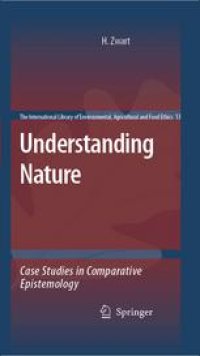
Ebook: Understanding Nature: Case Studies in Comparative Epistemology
Author: Hub Zwart (auth.)
- Tags: Epistemology, Philosophy of Biology, History of Science, Phenomenology, Science general
- Series: The International Library of Environmental Agricultural and Food Ethics 13
- Year: 2008
- Publisher: Springer Netherlands
- Edition: 1
- Language: English
- pdf
This summons clearly resonates with the “archetypical image” associated with water as a basic element, discussed in Chapter 2, water as the element of freedom, of mobility, of widening one’s horizon. Although Nietzsche himself refrained from doing what he summoned others to do, scientists like Darwin and novelists like Melville actually went to sea. Darwin, although regarded by Nietzsche as an arid 6 and mediocre mind, exposed himself to the experience of a long-term trans-oceanic voyage in the course of which he did discover new worlds, new justifications, new moral watchwords even (“struggle for life”) that were to have a tremendous impact on science, philosophy and even culture at large. Other perspectives are present in Moby-Dick as well, such as the theologian’s one, depicting the whale as the biblical Leviathan and the ocean as that part of the world where the great flood never abated. Indeed, the interpretation of marine p- nomena in Biblical terms is more or less omnipresent in the novel and also resounds in the views and language of the philosophical sailor and story-teller Ishmael. But what about the novelist’s whale? Actually, there is not one novelist’s whale. Ishmael-the-narrator unmistakably sides with the whaler’s point of view, but Melville-the-author is interested in, and tries to do justice to, a plurality of voices.
Comparative epistemology is the discipline that tries to assess, in a critical manner, the relative validity and value of various forms of knowledge. We tend to identify "real" knowledge of nature with science. Yet, science is not the only route to understanding and unlocking the truth about nature. Literature based on careful, true-to-life observations can also tell us much about nature as well.
This volume presents a series of case studies in comparative epistemology, critically comparing the works of prominent representatives of the life sciences, such as Aristotle, Darwin, and Mendel, with the writings of literary masters, such as Andersen, Melville, Verne, and Ibsen. The author shows how both scientific and literary disciplines make valid contributions to our understanding of nature.
The comparative analysis deftly weaves together fields of inquiry that tend to be seen as completely separate from one another. It constitutes a major contribution to the expanding field of science and literature studies, demonstrating how the sciences and the humanities can mutually challenge and enlighten one another.